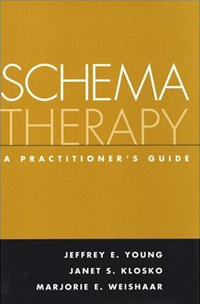This is the tenth in a series of articles that draw on the field of schema therapy, an approach to addressing negative thinking patterns that was devised by Dr. Jeffrey Young. You can find an introduction to schemas and schema therapy, a list of schemas, and links to other schema articles on The Willpower Engine here.

While the articles in this series so far have been about schemas that I’ve seen mainly in other people’s lives, I’m all too familiar with the subject of today’s post, entitlement. This schema is sometimes referred to as “grandiosity” or “superiority,” but the version that I have experience with fits the term “entitlement” best: it’s the sense that you’re naturally owed something. People with the entitlement schema may feel as though there are things they should be getting regardless of how practical, reasonable, possible, or equitable that is. Entitlement is the sense that somehow, the world owes you a living. For some people, this goes with a sense of being superior to most other people, or of having a special status or destiny that means that the rules that apply to other people don’t apply to you.
Entitled to act like an idiot
An example: when I was young, money was very tight around our house. Being a Vermonter, I was very familiar with maple syrup, but since it was fairly expensive, we didn’t get much of it. My entitlement schema told me that this was unfair and inappropriate, and that I especially, considering my excellent qualities, deserved to have maple syrup pretty much whenever I liked. One morning I was up earlier than anyone in the house and was getting milk from the refrigerator for my morning cereal when I spied the syrup can. Instead of having the cereal, I took out a small glass and filled it–with maple syrup. Then I drank it. Finally! The maple syrup I deserved!
A lot of things didn’t seem to matter to me as I drank my glass of maple syrup. It didn’t occur to me that if this syrup were replaced, it would increase the family grocery bill in an uncomfortable way. It didn’t occur to me that the syrup would not be available to my siblings, who after all liked maple syrup just as much as I did (except for my older sister, who bizarrely and inexplicably preferred fake syrup). It did not seem to give me pause that after the first mouthful, the huge amount of sweetness began to be a bit sickening. And at that time I didn’t know, and by all the evidence wouldn’t have cared, that the jolt of simple sugars in my body would give me a dizzying sugar high followed by a crashing sugar low, probably with a headache in the bargain. No sir, I was entitled to that syrup, gosh darn it, and I was going to drink my syrup and like it.
I drank my syrup, but I definitely did not like it. I apparently could ignore the sickening effects as I downed the glass, but I couldn’t ignore the much-too-powerful taste afterward or the awful way it made me feel. After that incident, I couldn’t stand to eat anything maple for months.
Broken ideas for the entitled
Entitlement schemas are often traced to two kinds of childhoods. One version is the truly entitled child, who is constantly indulged and/or assured of having a special status above normal people. The other is of feeling deprived (regardless of whether or not the child can really be said to be deprived), in reaction to which the child develops a belief that something is owed them–often, again, with a sense of having a special status.
People with the entitlement schema get fixated on the idea that they should be able to have or do something, or should be treated a particular way–even if the thing they think they’re entitled to does them or others harm, isn’t available to others, isn’t practical, takes more resources than they can afford, etc. This amounts to a huge use of the broken idea called a “should statement”–that is, “I should be able to have this!” Entitlement can also come out as “emotional reasoning”: “I feel as though I have a right to this, so I do have a right to it.” These attitudes only reinforce feelings of deprivation and lead to disappointment, selfish behavior, and ignoring consequences.
Breaking out of an entitlement schema
I’m glad to say that while my entitlement schema still pesters me every once in a while, over time it’s been whittled down to almost nothing as I gradually was forced to face the results of actions that, over and over again, proved that feeling entitled wasn’t going to get me anywhere. Every time I stayed up well into the night on the idea that I was owed some time and then felt exhausted the next day, every time I ate food my body didn’t need and then didn’t feel healthy and energetic, and every time I was late because I thought I was entitled to do a few more things before I went out the door, I ran smack into the reality that the idea of “deserving” things is not only untrue and useless, but dangerous and painful. Our feelings about how appropriate we think it is to have something, regardless of where they come from, do not generally have any effect on how practical, fair, kind, appropriate, or beneficial having that thing will be.
So every time an entitled person’s schema claims “You should be able to have/do this!” in a situation where “this” is something that would be best to avoid, the response that will diminish the schema and help shape a healthier vision of reality is to redo that thought, to repair the broken idea. The repaired version will often be something like “I can see that I want that thing, but that doesn’t mean I have to get it, especially since it _____” (and here you list the things that matter to you that would be harmed by following through on the desire). In the case of my glass of maple syrup, that blank might have been filled with something like “will make me sick and I’ll regret it for months” or “will take scarce resources from my family.”
Like any schema, entitlement schemas supply plenty of opportunities to act embarrassingly or in ways that hurt ourselves or other people. What’s truly joyful is being able to break out of a schema by paying attention to our thoughts and shaping a future that will actually create happiness and fulfillment rather than being dragged down by the bad ideas we may have adopted long ago.
Photo by Sighthound
Like this:
Like Loading...
 While I was compiling the schema therapy self-quiz that has run here at The Willpower Engine over the past week (to take it, start here with part 1), I began to realize that the principles behind the schemas amounted to some advice about how we can live happily and fulfillingly. This shouldn’t be surprising to me: after all, the whole point of learning about and working on mental schemas is to live a happier and more fulfilling life, so the fact that the schemas offer recommendations on how to do that shouldn’t be too shocking.
While I was compiling the schema therapy self-quiz that has run here at The Willpower Engine over the past week (to take it, start here with part 1), I began to realize that the principles behind the schemas amounted to some advice about how we can live happily and fulfillingly. This shouldn’t be surprising to me: after all, the whole point of learning about and working on mental schemas is to live a happier and more fulfilling life, so the fact that the schemas offer recommendations on how to do that shouldn’t be too shocking.










